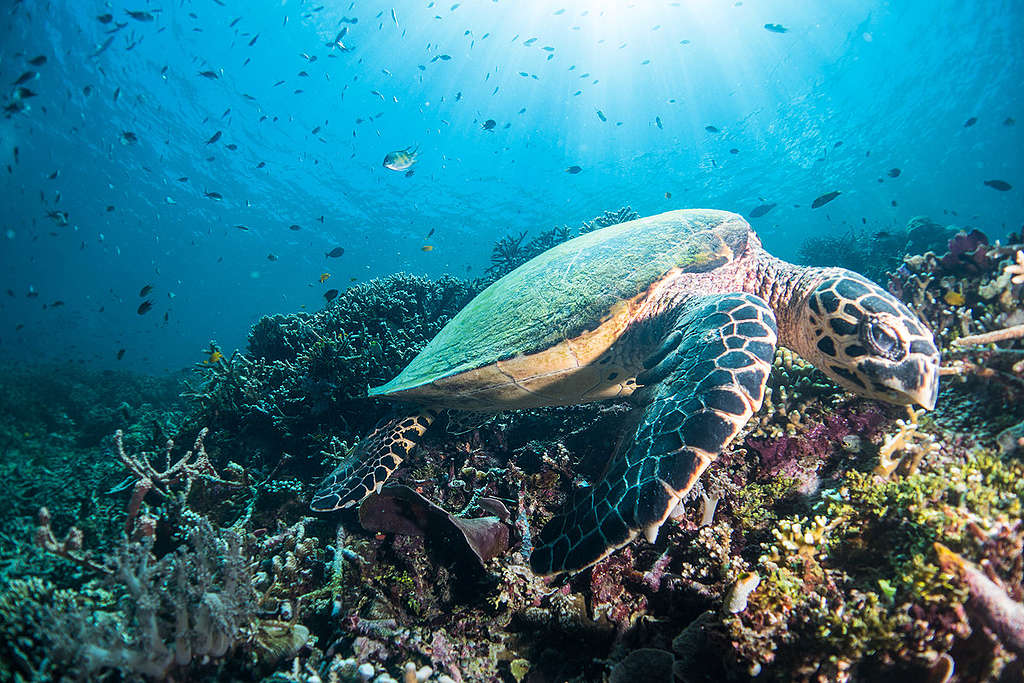Bangkok, Thailand, 25 August 2020 – Lack of support and accountability for migrant fishing crew remain a failing issue, with only 20 percent of major southeast Asian tuna brands providing measures to reduce, or eliminate modern slavery at sea, according to the latest cannery ranking report by Greenpeace Southeast Asia.
“Sustainability and Justice on the High Seas” is the fourth edition of the ranking, which analyses whether brands are working towards a more traceable and sustainable sourcing of tuna. A total of 20 companies were scored including Century Tuna, Nautilus and Ayam on issues such as traceability, sourcing policy, and transparency and customer information. Whilst more recognition is being paid towards issues of forced labour, which is rampant in distant water fishing fleets, brands and canneries included in the survey are yet to improve on measures relating to elimination of forced labor at sea.
“Globally, tuna stocks continue to experience intense pressure from destructive fishing practices, overfishing, and illegal, unreported and unregulated fishing (IUU). While considerable progress has been made by the surveyed companies in working towards a more traceable and sustainable sourcing of tuna, measures towards a worker-friendly canned tuna industry that is free of abuse are in desperate need of verifiable time-bound commitments,” says Ephraim Batungbacal, Regional Oceans Research Coordinator at Greenpeace Southeast Asia.
Companies with an overall good (green) rating are P.T. Citraraja Ampat Canning (Indonesia), Super C Chef (Thailand), Alliance Select Foods International (Philippines) and P.T. Samudra Mandiri Sentosa (Indonesia).
Among the findings:
● 13 (65%) of the 20 companies publicly support the Work in Fishing Convention (ILO C-188) by supporting advocacy efforts and its full implementation.
● 11 (55%) of the 20 companies have established measures for the early detection and prevention of modern slavery at sea.
● Only eight (40%) of the 20 companies refuse to source tuna from vessels that collect guarantee deposits from its crew.
● Only seven (35%) of the 20 companies require a list of migrant fishers on board.
● A paltry four (20%) of the 20 companies have whistleblower and anonymous hotlines or email where affected migrant fishers can file complaints.
“Companies must perform due diligence on human rights and sustainability beyond what is necessary in other sectors, especially as tuna fishing remains an exceptionally high-risk industry. Representative worker organizations and labour unions provide the strongest protections to workers and companies should create enabling conditions for fishers, especially migrant fishers, to form and lead their own unions,” says Batungbacal.
To achieve a more sustainable and socially just fishing industry, Greenpeace Southeast Asia is calling for companies to source from sustainable fishing gears such as pole and line, or FAD free purse seining; adhere to corporate responsibility to respect human rights as outlined in the UN Guiding Principles on Business and Human Rights; and phase out at-sea transshipments and consider sourcing from suppliers and from vessels that only spend a maximum of three months at sea.
ENDS
Full copy of the report, “Southeast Asia Canned Tuna ranking: Sustainability and Justice on the High Seas (2020 edition)” available here.
Contacts
Ephraim Batungbacal: Regional Oceans Research Coordinator, Greenpeace Southeast Asia, (+63) 917 866 3036, [email protected]
Shuk-Wah Chung: Communications Lead, global fisheries campaign with Greenpeace Southeast Asia, (+61) 405 698 690, [email protected]

The threats facing our oceans are getting more urgent, find out how you can make a difference
